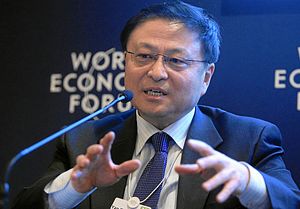This interview with Yan Xuetong, director of the Institute of International Relations at Tsinghua University in Beijing, was first published in THE BERLIN PULSE, Körber Foundation’s guide to German foreign policy. For German public opinion on German-Chinese relations, please visit www.theberlinpulse.org
Körber-Stiftung: Both Germany and China are debating whether they need to take on more international responsibility. Do they have a similar understanding of what international responsibility means and entails?
Yan Xuetong: In Germany, it seems popular to regard international responsibility mainly as economic aid to other countries. I do not find this very helpful. Real international responsibility mainly means security protection by major powers to weaker countries. But it is very interesting that both China and Germany are simultaneously facing pressure from the international community to undertake more international responsibilities. The reason could very possibly be that America is no longer willing to implement global leadership, thus, the whole world is expecting rising powers to fill that gap. This expectation does not mean that China and Germany are qualified to fill the vacuum of America’s global leadership. It is quite possible that we will witness a world without any single country exerting global leadership for the next five to ten years. I would therefore suggest both China and Germany to concentrate on regional rather than global leadership. Providing qualified regional leadership will serve both their own as well as their neighbors’ national interests.
Does Germany’s ambition to take on more international responsibility have any significance for China at all?
Above all, China will benefit from Germany maintaining peace in Europe. It seems to me that most Europeans consider Asia a more conflictual continent than Europe. For instance, North Korea’s nuclear issue could easily give that impression. People tend to ignore the fact that there have been many tensions but no wars in East Asia since the end of the Cold War. I believe Europe actually faces a higher risk of major clashes than Asia. Looking at the post-Cold War history, we can find several wars in Europe, for example in Kosovo, Georgia and Ukraine. Also, secessionism, which has often been the source of civil war, is gaining momentum in Europe, and immigration has already fueled racial tensions.
You have argued that while non-alignment has suited China in the past, China should form stronger alliances to enhance its power and influence. Are Germany and Europe on this list of potential allies?
First and foremost, China’s immediate neighbors are more important to China than European countries. Not every neighbor of China is a potential ally, but some of them share common security interests with China, such as Russia, Kyrgyzstan, Uzbekistan, Kazakhstan, Tajikistan, Pakistan, Thailand, Cambodia and many others. There is no common interest between China and European states to form an alliance at the present time.
Which issues will be most important for Chinese-German cooperation over the next decade?
Trade and environment are the most obvious fields in which China and Germany can cooperate based on shared interests. But I believe China and Germany should not only consider how to do business, generate wealth, and clean the air, they should develop cooperation beyond these two fields and consider how to establish new norms for the future world order. The current norms that were established after the Cold War are no longer suitable for the changes of today. Globalization has turned many domestic issues into international issues, and new norms should reflect this. Therefore, China and Germany should first establish stable orders in their own regions and then work together on developing new norms for global trade, finance, security, immigration, and anything necessary.
You argue that in order to become a true superpower, China also needs to win hearts and minds abroad. China has not quite yet won the hearts and minds of Germans, for example due to a lack of reciprocity in trade relations but also due to differing attitudes with respect to human and civil rights.
Economic cooperation does not speak to people’s souls. If China wants to win German hearts it should cooperate more with Germany on cultural issues. Also, China should consistently practice the values it advocates to the world at home in order to strengthen its political leadership. This is a precondition for increasing Chinese soft power. The inconsistency between the ideology guiding foreign policy and that guiding domestic affairs is a serious problem to which China should pay a lot more attention.
What do Western countries need to understand about North Korea in order to play a meaningful role in the conflict?
We need to understand why North Korea is desperately developing nuclear weapons. North Korea is not a modern country. It is a feudal system. Power is owned by one single family, not by a party, not by the people, not by the society. Kim Jong-un regards nuclear weapons as the only means to keep his family regime alive. So no matter what economic disasters the international community imposes on North Korea, Kim will not give up. He will not give up his family’s security guarantee for money. If Europeans understand this, they can play a more positive role in preventing war in East Asia. For instance, when people get an illness, they certainly want to cure it. But if they cannot cure it, they have to consider how to live with it. Now, what is the most urgent objective for the international community with respect to North Korea’s nuclear issue? I would argue, to prevent this illness from spreading to other parts of the world rather than to cure it! To prevent further nuclear proliferation is more urgent and pragmatic.
For German public opinion on German-Chinese relations, please visit www.theberlinpulse.org

































